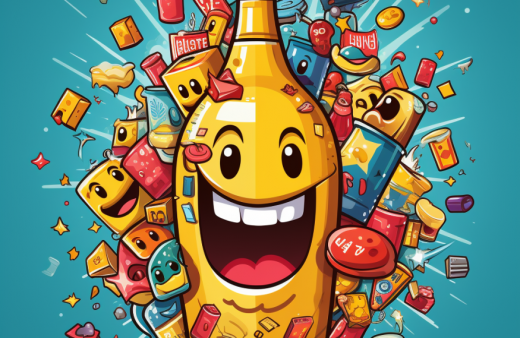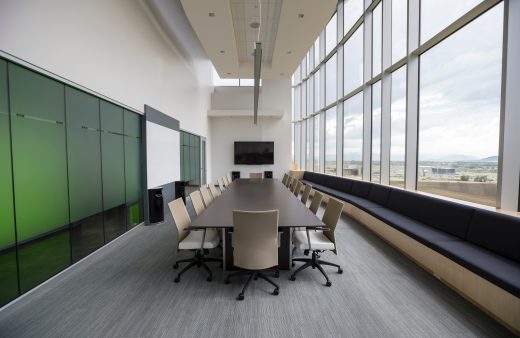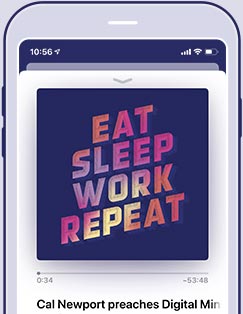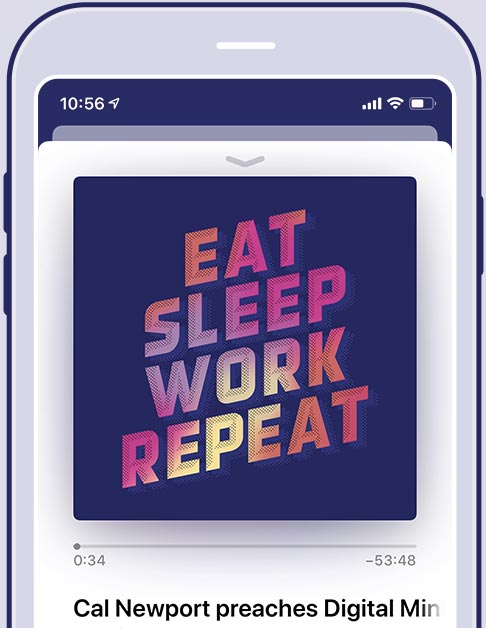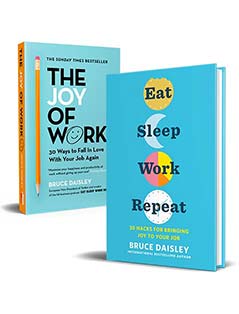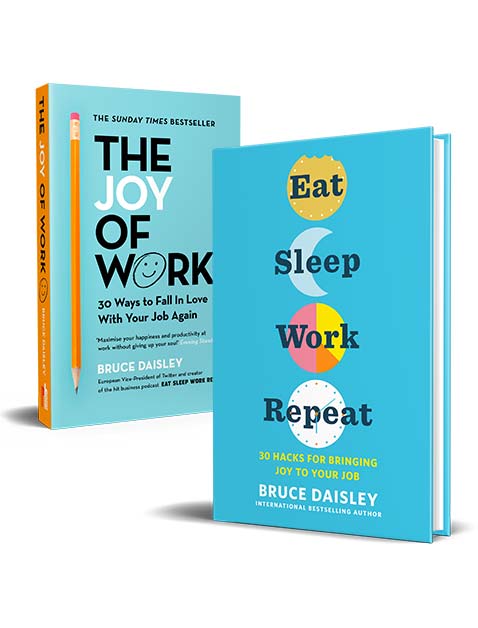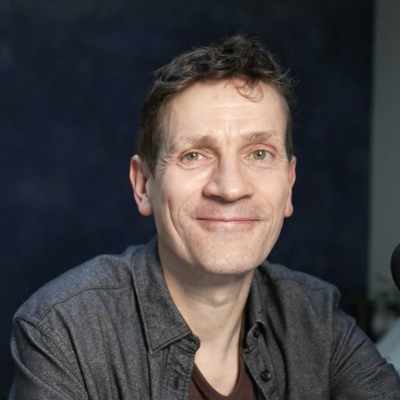The Surprising Secret of Workplace Creativity
If most people knew the enjoyable secret of workplace creativity they’d probably feel liberated from the judgment of their peers. In this episode we hear inspiration from the ideas of Lucy Kellaway (FT journalist) and scientific evidence from Professor Sandy Pentland. Professor Pentland explains the single activity that characterises creative workplace – and it’s probably something that you love doing.
Full transcript:
- Ideas and creativity come from workplace chatter
- People tend to bounce ideas off each other
- Traditional style meetings aren’t effective for idea creation
I’m taken with the idea of Social Physics – can you explain to us what it means?
ALEX PENTLAND: Well it’s a very old idea. It almost so simple it beggars common sense but about two centuries ago when alchemy was becoming chemistry and natural science was being labeled as physics. In France there was a movement to create social physics and the idea was to take statistics and apply them to information about society in order to be able to have better government and understand culture change. And at the time of course statistics was just being invented. They had the very first census type things and so that was the vision – putting those two things together. And of course today we have this everywhere you know more or less in the whole world. But it got stuck and it got stuck because they didn’t have sophisticated enough statistics. They didn’t have enough data except things that were from surveys which are expensive to do. So you know it’s the census that we know today in various countries. However in the last decade we have now a digital world where there’s data about everything and machine learning and you know modern statistics is far more powerful than it ever was. And so you can revive the original idea of being able to understand society better than we have done previously. And and to understand why that’s important you have to understand that almost everything we know about psychology comes from questions given to fresh people in their Psych 101 class or laboratory experiments (again mostly on westerners) with a small number of people or just anecdotes and stories. And so you know the whole idea we have about ourselves is based on very little evidence. And so now there’s the possibility of making a much better understanding, scientific understanding not just of individuals but of groups of people and society and how things happen. That’s social physics!
Classically we’ve seen creative people as those people who can produce ideas. But social physics seems to sort of show us the same for organisations. What are the characteristics of creative organisations.
ALEX PENTLAND: Well you know we have tension in the world in different cultures. Western tradition tends to focus on the individual and the creative genius. Eastern tradition tends to focus on revealing the underlying truth and it’s seen as much more of a group activity. What the data suggests is that most of the time most places, innovation is a group phenomenon. And the most creative people are actually people who go around and collect ideas from lots of different people, play with them, bounce them off to other people. So they’re really sort of sculptors with ideas and people who are playful with ideas and when they find ideas that stick together nicely. That’s something that we call ‘oh they created this new idea’. Well they didn’t really create it they harvested it and shaped it and sculpted it and then proved it by bumping it off lots of other people. And then maybe the lone genius who creates things. But but the evidence argues that that’s a rarity. It’s really a co-operative phenomenon. And so we should start to think about making societies where these flow of ideas is much more ready and where playing with ideas is much more of an accepted sort of thing. And the evidence is that that that results in much more creative societies.
And so one of the things that seems to come out of the work that I’ve read by you is that importance, when it comes to those creative societies, the importance of face-to-face relationships even to the extent that digital relations are less effective. People tend to rely on their friends opinions more if they have got a real life relationship with them as well. Does have an impact for remote remote working goal the way that teams work together over distance?
ALEX PENTLAND: What you need to realise that you know the human race existed before there was language. I mean we we had groups of people, we had signals that dominance of attraction when we got together and did things. And we still have all those signaling things – how you say it, the tone of voice, the body language things like that. And email doesn’t have any of that more ancient type of signaling. Whereas face to face. And in fact this sort of one on one video conferencing has a fair amount of it . And so when you cut off the human context with signaling about agreement and how you react the tone of voice the body language when you cut that off you get a really impoverished communication. So that’s the stuff you get on email and on Facebook and places like that. It’s OK but it strongly impoverished. And so distance education has tended to be just one way, maybe it’s video, but it doesn’t have the interaction. And communication ancient parts of it, we expect response from people it’s part of how we shape communication. So for instance what we’ve been doing in online education is bringing people into small groups of say 4 people and current day Skype and other things like that support these small groups. And what that means is that you can get much of the experience of face to face in small groups. You just can’t get it where one person speaking to a thousand others.
Right. So what one of the things that so tell me if I’ve got this wrong. When I was reading through social physics I got the sense that creative teams tend to be creative when this is almost like the dancing of bees I think is one of the ways that you describe you know this sort of this almost kinetic reaction relationship between people they’re sharing information often in short bursts. And it’s discussions as well as meetings and so on and so ideas come from those frequent exchanges of ideas and bouncing things off people. And I was really fascinated with how that would become systematized because one of the other things that in my studies I’ve noticed is that there was a really fascinating method of working which is the Results Only Work Environment. I’m not sure if you’re familiar with this but this is the idea where there’s no Nine to Five. You’re tasked with doing a a task or responsibility and you can fulfill it in any way you want. And it seems like a very liberating way to harness the fruits of the internet really. To harvest the opportunity that we’ve got now to work from anywhere. But this seems to be some conflict between that and Social Physics because a lot of the Results Only Work Environment. People don’t come to work and the impression I’ve got from your work is that creativity lips when people get together face to face.
ALEX PENTLAND: So what the the data, the statistics, the evidence says is that again it’s not you know ‘oh this person’s off by themselves mining and various resources’ that that’s OK, that’s good to do. But it’s much more powerful when they get together and they bounce the things they’ve found off everybody else. Thinking about having a group of people all of whom are engaged in a treasure hunt think of it that way. You know so everybody goes off and looks in different places. But then you validate what you find by bringing it back together and bouncing off people. Doesn’t have to be a physical thing because you know things like video conference one on one video conference – two people, three people. That works pretty well for all of the signaling and we can bring together ideas sort of like we’re doing now. And I can see when you get excited. I can have that sort of jazz combo because that’s what it’s really like. It’s like people playing jazz together they riff off each other they respond to each other but you have to bring something to the table to have a good session. So people bring their new ideas their enthusiasms and then riffing with each other is what it’s about. Again that sort of lone genius up in the cave on the mountain.
OK that does sound very compatible with their ideas because their ideas is that you shouldn’t do any meetings just for the sake of meetings. So it seems to be compatible with what you’re saying. And said that unless there’s an interaction unless they start an exchange of ideas then just marking time in the meeting in itself isn’t productive.
ALEX PENTLAND: Most meetings are really sort of an education/brainwashing session. The boss says here’s the new thing. Everybody listen. Everybody nod your head. Really very little interaction happens at all. No that’s not the source of creativity.
Tell me this. So do you think I chat to a guy who had to sort of a fascinating idea that was he said the comparative advantage the the the office size has is that I can do emails at home. But the comparative advantage that the office has is that I can either meet people by schedule or I can meet people by accident. And so he’s narrowed his working hours in the office down to a smaller number because that allows him to be more productive and dynamically there. Can you see work evolving in that direction then, that we try to use our time together more productively.
ALEX PENTLAND: Yes. So the the the structure I like best actually is one where they call it co-working or distributed working. And so rather than everybody drive downtown to the big building where everybody has to sit there nine to five. You can imagine that some you do at home but some you do in a little local office that may include people from other companies for instance right. Like co-working places do or people from different parts of your company. So if you went to the little local place, first of all your commute is a lot less it’s a lot greener things like that but you also have people from other parts of the organisation there that will get to know. So you’re building ties within the organisation. You get to hear what’s happening in sales you get to hear what’s happening in research. You get ties for experts. And what the evidence and data says is those ties between different parts of the organisation are really important for innovation in the organisation and for overall efficiency in the organisation. And the fact that it’s a lot less commuting. And you get to know people in your community is just as equally huge on a personal level.
Yes. So what’s the innovation the creativity comes from those those connections. It also is more socially enhancing as well.
ALEX PENTLAND: Great win win and it’s cheaper for the company because the rents are lower in the suburbs where people live than they are downtown.
Your work is sort of a combination of big data and psychology, human interaction. And the the badges that you’ve created. How widely have they been used how widely have the badges been adopted.
ALEX PENTLAND: Well they used pretty widely and in research and companies use them to sort of find out how they’re doing. It’s sort of like a diagnostic thing. It’s like they put all this money into architecture for an open plan office. They spend $2 billion renovating the space but they never know if it’s good or bad because they never test it. So what people are beginning to do is when they renovate a space they’re asking people to wear the little badges for a few days to find out do people really interact more? Was these millions of dollars in architecture spent well or stupidly? And sometimes they don’t like the answer. But but by doing that you can sort of see how you can build offices that work better. Without having data about it is just people’s opinions.
What are the findings? How do open plan office perform?
ALEX PENTLAND Well open plan offices are not real good and I think people are coming to that realisation. They haven’t sort of figured out exactly what to do to replace them. But having different plan offices where there’s lots of different types of spaces seems to be where people are headed now and those do indeed seem to work better. So you need to have a little private space. You need to have meeting spaces that are not a pain you can just use them but you don’t have to like sign up and we can advance. Video conferencing can’t these special places it has to be everywhere. But in that sort of environment where you get to know the people around you because they have little private spots but you also can meet with other people and you can have different sorts of quiet spots and things like that. That seems to work a lot better you know. So I think that that the variable space is important. I also think though that different types of job require very different types of spaces. So a lot of people haven’t gotten to yet. Right. Is is that they just sort of they’re just trying to think much too simple because pretty clearly if you’re you know if you’re an artist assembling things that’s different than being the big boss of a corporation, which is different than being in a creative team or a sales team that’s a different thing yet.
So there’s not one size fits all.
ALEX PENTLAND: Basically it’s not one size fits all.
Those are the things I’ve really enjoyed about your. You will the Social Physics book was that you talked about the phenomenon of people doing any activity simultaneously triggers endorphins and what so whether that breaks or whatever. And the one thing that you say it’s you said the single simplest way to increase productivity is to make lunch tables longer. Just like these easy little fixes to try and make people do things simultaneously. So that was a fabulous example of a call centre that was asked to take a break. The teams were asked to take a break simultaneously and they went back and even had breaks previously. They were 15 percent more productive.
ALEX PENTLAND: A lot of that is you know people are actually social creatures. So having a little social reinforcement helps. For instance in the call center. Very stressful job. People yelling at you all day long. So having some people who are normal people that have rich signaling so it’s Face-To-Face that you can sort of calm down and talk about other things is really important. But also those meetings allow you to trade tips on how to do things. So it’s a source of innovation and it’s not the official like the boss saying here’s the new script. It’s what do you do when something happens when the guy yells at you like this. So is building a culture that helps people stay stable and happy but also helps them down to community.
Right. Got it. So it’s OK. Got it. So it’s what I suspect most jobs have got something similar where they could… that gap coming together that could probably be productive I presume.
Yeah. Everything we’ve looked at. All the different types of businesses, they all share this characteristic of building diverse social ties, building everybody inclusive in the work group things like that. Those are always good. They’re always good for five or 10 percent increase in productivity, increasing innovation. You know in some ways the simplest thing you can do to be able to make the place work better. And the interesting thing is it feels good to people too because it means you’re not trapped in this little you know isolated area. It gives you more emotional support. So it’s actually good for everybody in pretty much all in all regards. That said you know it’s not like you’re supposed to be socializing all the time. It’s just different jobs and different amounts that are correct. But everybody needs some of it and diversity in your socializing is just really critical for organisational health.
The interesting thing where I guess a lot of us have this notion this sort of preconceived idea that you can tell a successful team he can tell a successful business because this feels to be like a buzz and energy to it and your work him to be a validation of that saying that actually that sort of buzz directly transfers into creativity and productivity.
ALEX PENTLAND: It’s interesting that you can actually measure. Yes. You have a buzz-o-meter, right. You know, you guys are really cooking or you’re not. Again it’s a little like jazz. You know you can tell when they’re cooking everything’s sort of synchronous and everybody is you know trading back and forth and the energy about it and it’s not just subject to fantasy right. It’s something that you can actually measure.
So what if you are going to give people one or two pieces of advice when you take a look? Is there anything that you advise them to do.
ALEX PENTLAND: Well for what. Right. But but just generically you need to maintain a diverse set of thinking of connections to other people to diverse sets of other people you need to have exploration in your life that’s important for innovation. It’s important to keep all of the mechanisms working and then you need to also keep your core group sort of in the loop. So you have to remember to come back in and talk to them. And you know coordinate with them and make sure that everybody’s on the same page. So this is this sounds very old in some ways but it’s realizing that the reason you must do this for the core group is to make sure that everybody is on the same page you’re all working in the same direction. You all have the same information you’re all you know helping each other. And then for the exploration to other groups because that exploration is what brings in opportunities that make life good that make you more wealthy that makes you survive when there is a problem. So a way to think about it is a little bit like the bees. The bees go out and look for honey. And they come back and they dance to each other to get other bees to go out in and use this new honey they’ve found. And and every animal shows every social animal shows the same behaviour where they explore individually for new food sources and then they come back together and they trade tips on where the food sources are. In humans it’s not so much about food it’s about ideas. Ideas are not just little factoids they are opportunities. You know if you see this sort of thing you can do this and then you get that. It’s it’s it’s lots of little micro-strategies and things that you can begin harvesting to make your life better for you and your family and friends. We constantly harvest, bring them back, share them with other people and it’s not just nice to have or about emotions, this is actually a survival strategy. It’s what you have to do to survive in a changing world.
The final thing that was interesting is that you talk about the idea of a Charismatic Connector and how leaders can often play a role of connecting new ideas even if it doesn’t necessarily feel personally well-suited to them. And it seems like an evolved version of management by walking around probably a more useful version of management by walking the idea that just connecting people and hearing things across a workspace can have a creative contribution. Is that right. How would you describe the charismatic connector?
ALEX PENTLAND: Charismatic connectors are are very distinctive in that they are interested in everything. I don’t know if you meet people like this, I think we all meet people like this. They come up and they say how’s it going and what they’re really trying to hear about some new thing or a new idea or you know they’re harvesting interesting new opportunities new ways of doing things in the world and they’re just really interested in this. They’re trading ideas basically. So they’re asking you for something new and in return they’ll tell you about other people’s ideas. “How did you hear that Mary Beth did X,Y and Z. How about you what are you up to?” And so they’re they’re trying to spread these ideas around. They’re trying to share them with people. They are genuinely interested in what you’re doing. It’s not a fake thing at all. And they they get in return of course they’re the ones that hear about a lot of these ideas first. They are the ones that in some ways build up the biggest bank account of ideas. And as a consequence they’re in a good situation. Whenever changes come along or opportunities come along. And I think that’s what’s distinctive about them is that there’s this hunger to hear about new things and to share them.
Got it. And you said that that’s a role that people don’t necessarily always feel like they’re born into but you can say you can develop your capabilities.
ALEX PENTLAND: Yeah. You just have to realize you have to give it a shot. Right. And and that you know people will tell you about stuff if you share back with them and it doesn’t have to be about you not all talking to you when you begin sharing with people. When we got to talking to people harvesting these things you can share that with other people. Obviously don’t share private things. And you know people says isn’t that gossip. Well yeah that there’s good gossip too, good gossip is what keeps us all up to date. And so you know anybody can do that and it’s pretty rewarding.
Is there anything from your subsequent work to you that you think is.
ALEX PENTLAND: I guess the only thing I would say is is that a lot of these ideas the questions you’ve asked a bit about small groups and individuals. but you see the same thing at societal scale. Remember the original vision was to have a better society. And when you look at whole communities like whole neighborhoods you see the same effect so neighbourhoods that don’t talk to each other very much and are involved in the rest of the society are invariably neighbourhoods that are rather like ghettos they’re poor they have high crime they don’t live in very healthy. Neighbourhoods that talk to each other and talk to the rest of the community do much better. They make more money, they live more healthy, they have less crime. So on and on and on. That’s really interesting. It’s sort of a recipe for a healthy neighbourhood. And even when you look at larger scale you compare states to each other. Some states are not very communicative. Other states are full of these connectors and the states that are full of connectors are – not surprisingly – the states that do better. And so the traditions of these things happen at lots of different scales and it’s a recipe for making better societies. Also the things that happen on a one to one scale you see reflected in the large scale like for instance people who live only online, communities that live only online often find themselves in echo chambers. Then you get all this political polarisation and problems that come from that. Communities that actually have face to face on occasion and rich communication rarely have that sort of problem. It’s something that’s easy to lose and hard to restore. But it’s it’s a valuable thing for the health of the community.
So how do you reconcile those two things. And so committees that have got lots of connections between them are healthier but spending too much time exclusively online can be an issue. Can you see an easy solution from where we are now to getting to that healthier state.
ALEX PENTLAND: Well I think one of the big things that we need to do. If you look at the statistics of two English speaking western communities countries you see this enormous segment segregation of poor people and rich people. So the poor people live in one place, the rich people another and so they don’t talk to each other. So you need to sort of figure out a way to make that not happen. You know back in the eighteen hundreds there was Upstairs Downstairs but at least they lived in the same spot. In the war period I think that there was enough mixing that you got to see people who weren’t like you. But today that’s not not true. And I think that’s the source of a lot of our problems.
Like you say a war type environments produced this melting pot where everyone was mixed together.
ALEX PENTLAND: Yeah. If you look at countries where there’s a national draft and everybody serves the country for a couple of years. They sometimes have much better integration across different classes than other places. It’s not like you want everybody in the military but you know in the 1930s in this country there was a very large fraction of people that were involved in building roads and restoring parks and building hospitals and doing public service. And the people involved in that were from all social classes. It wasn’t just the the poor people. And so you can imagine as you come out of high school spending a couple of years doing that as a national service and that might go a long way towards promoting a better social dialogue at a national scale.
That’s really fascinating because it is lot of societies, there’s a lot of countries that do have some form of service so Israel has a public service and they like you either do military or you do in technology. And I wonder if that produces…? I don’t know if Finland has that anymore, it used to. So these are very communal countries. Right. They have very strong social fabric. Or maybe it has something to do with the experience you have as a young person.


